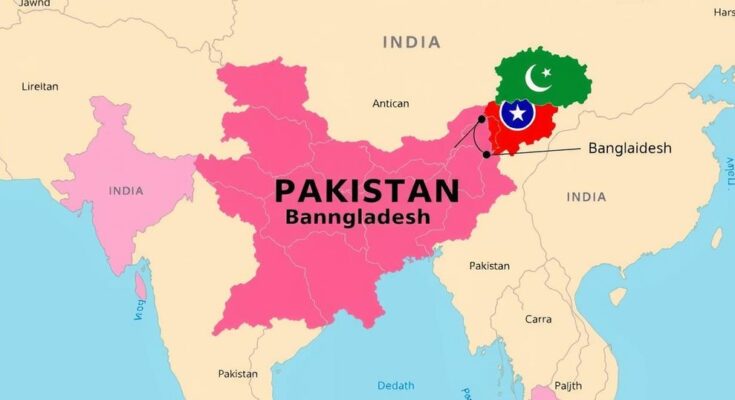The political changes in Bangladesh following Sheikh Hasina’s ouster have sparked improved relations with Pakistan, including direct trade, military collaboration, and simplified travel protocols. This shift, perceived as a strategic maneuver against India’s influence, raises concerns in New Delhi, given the historical animosities rooted in the 1971 war. As ties evolve, the potential for increased bilateral trade could shape future interactions.
The recent political upheaval in Bangladesh, culminating in the ousting of Prime Minister Sheikh Hasina last year, has fostered unexpected developments in its relations with Pakistan. After decades of hostility, direct trade was initiated as Dhaka imported 50,000 tonnes of rice from Pakistan. Additionally, resumption of direct flights, military contacts, and simplified visa processes, along with reports of security cooperation, signify a thawing of relations between the two nations.
The animosity between Bangladesh and Pakistan, rooted in their painful past, can be traced back to the 1971 independence war when India supported Bangladesh’s bid for sovereignty. Although relations improved temporarily between 2001 and 2006 under a different government, the subsequent 15-year governing period of Hasina created a rift, influenced by India’s backing of her regime. However, as political dynamics shift, the relationship appears to be progressing towards that of two neighboring states.
Humayun Kabir, a former Bangladeshi diplomat, observes that the two nations are “returning to a more normal relationship,” which has garnered attention from India, given its historically strained ties with Pakistan. Following Hasina’s departure, tensions with India have risen, particularly regarding India’s lack of response to Bangladesh’s requests for extradition and the ongoing political unrest.
Experts suggest the revitalization of ties between Bangladesh and Pakistan may be strategic, aimed at countering India’s influence in the region. Ayesha Siddiqa, a Pakistani academic, indicates this emerging cooperation may represent a commonality to resist Indian dominance.
In conclusion, the evolving relationship between Bangladesh and Pakistan is characterized by renewed trade, military interactions, and diplomatic engagement, marking a shift from decades of animosity. While historical grievances remain a hurdle, the countries appear focused on improving bilateral trade and addressing ongoing political dynamics. Given India’s vested interests in the stability of Bangladesh, developments in this relationship warrant close monitoring. The outcomes of these interactions could redefine regional geopolitics and trade dynamics in South Asia.
Original Source: www.bbc.com




